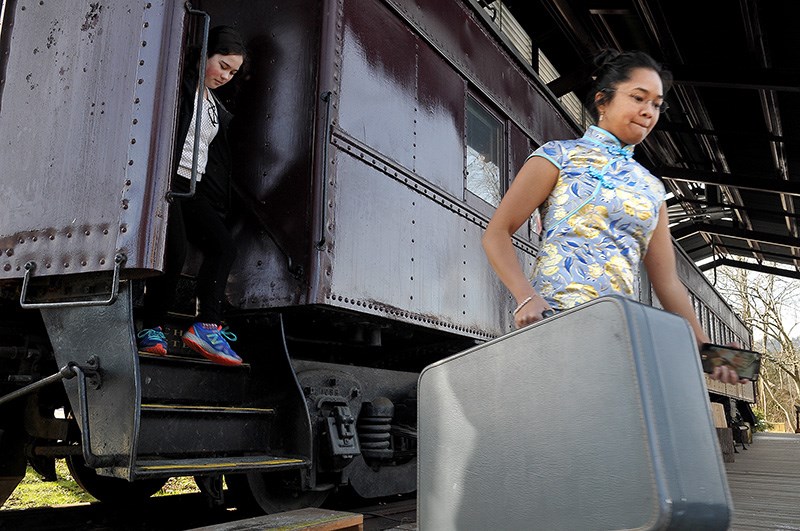The stories Elita Chan’s parents told her of their immigration from China to Canada became real on Monday.
That’s when the Grade 10 student got off the train at Port Moody station with only a suitcase and checked in at the immigration desk. The contents of the suitcase and the life they represent belonged to a fictional character, but the experience echoed the authentic arrival of so many new Canadians, including the families of Chan and her classmates in Mia Lehtonen’s Social Studies Art Enriched class at Burnaby North secondary.
The students collaborated with Port Moody’s Station Museum to recreate the experience of immigrants arriving by rail to start a new life in the city in the early part of the 20th century. The suitcases packed with belongings, treasures and life stories researched and curated by the students will become part of a new permanent exhibition at the museum called Unpacking My Suitcase: Immigration to Canada.
Markus Fahrner, the museum’s coordinator, said it’s a particularly important time to share the immigrant experience as some countries close inward and fear the intentions of newcomers.
“People can wake up and realize there is no danger,” Fahrner said, adding the suitcase is a particularly powerful metaphor because it’s often all that new immigrants are able to bring with them when they seek a new life in a new country.
“You look into that suitcase and realize there is someone in there who is like you,” Fahrner said.
Lehtonen said the project gave her students the chance to “live and breathe the experience of immigration” and discover what it means to be an immigrant.
To find an answer, students were charged with creating a fictional character based on their research of real immigrant stories. They then packed a suitcase with photos, tokens and treasures to represent the life they were leaving behind and their dreams for the future.
Chan, and her classmates Zuzanna Liniewski and Emily Zhang, created Aishe Boswell, a Romani Gypsy fleeing a life of uncertainty and persecution in France. And while none of the students could directly relate to the illiterate young woman, they found parallels with their own families and the challenges they faced when they arrived in Canada.
Like Zhang’s parents who had Master’s degrees in China but had to “relearn everything” and start over again at subsistence jobs.
Or Liniewski’s family who fled Poland when the country was going through political turmoil and nobody was sure how it would play out.
“It connects you to our own stories of coming to a new place,” Chan said.
Which is exactly Fahrner’s hope when the suitcases go on display at the museum.
“Each of us could have come off that train,” he said.



